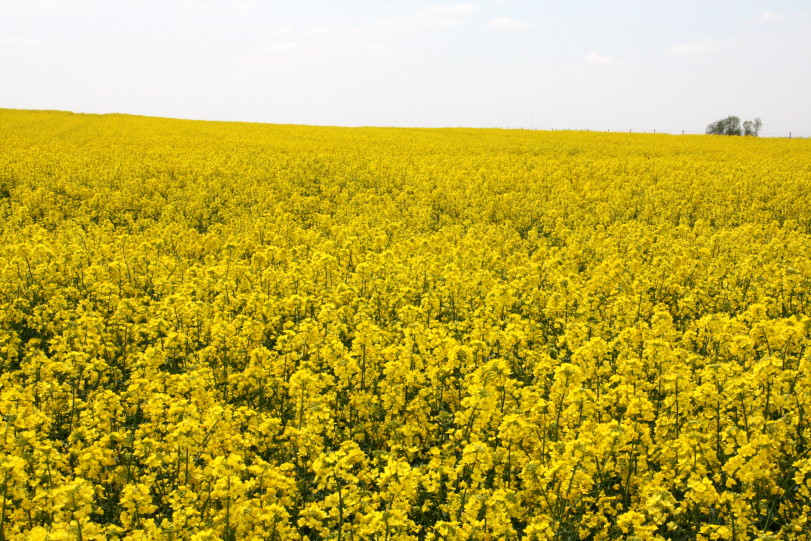
Agricultural News
Canola and Sunflower Checkoff Rate Set in Oklahoma
Mon, 26 Apr 2010 3:59:03 CDT
 Members of Oklahoma's new Oilseed Commission have set checkoff rates for winter canola and sunflower production in the Sooner State.
Members of Oklahoma's new Oilseed Commission have set checkoff rates for winter canola and sunflower production in the Sooner State.
Meeting 'Thursday at the Oklahoma State University agricultural experiment station at Lahoma for a field day, commission members, with grower input, voted to charge a half cent per dollar when farmers sell their crop at designated terminals.
"This rate eqals one half percent of market value at the time the crop is sold," said Alan Mindemann, Apache, Ok. farmer, who serves as the secretary/treasurer of the new Oilseed Commission.
Checkoff funds are typically used to finance research, promotion and other efforts considered to be beneficial to the agricultural commodity represented.
"The first checkoff funds for winter canola in Oklahoma will be charged this spring when the current crop is harvested," Mindemann said. "No sunflowers are being grown at this time in Oklahoma. The checkoff will be applied to that crop when it is harvested."
Members of the Oklahoma Oilseed Commission, along with Mindemann, are: Brent Rendel, chairman; Kelly Chain, vice chairman; Lee Leeper and Brent Thompson, members.
"The 2010 winter canola crop really looks good," Mindemann, who has 200 acres, said. "Our field day at Lahoma was really good. We had a good producer turnout and the OSU scientists had a lot of good information to share with us."
A new crop to be grown in the Southern Plains states of the US, canola, an important oilseed crop originating in Canada and the northern US as a spring crop, was chosen by OSU agricultural scientist Dr. Tom Peeper and a group of ag scientists at OSU and Kansas State University to be a likely crop to develop for rotation with winter wheat, the most important crop grown in the plains states.
But winter wheat, grown continuously on dryland farms located in the moisture-starved plains, has a number of production problems which rob farmers of important income when the crop is sold at market.
The most important problem facing winter wheat is a weed problem. For many reasons, perennial weeds like cheat grass and wild oats, grow profusely in wheat fields, defying the best attempts to find a control method. Much of the time, the only control at hand is the application of expensive herbicides.
Ideally, according to Mindemann, the best approach to solving the problem was to find another money crop which could be rotated with winter wheat.
Searching for such a crop, Land Grant unversity agricultural scientists, along with involved seed companies, seized on canola, which originally was a spring crop. Geneticists were able to develop a winter-growing canola and began to test new varieties in Texas, Oklahoma and Kansas.
The new winter canola, which has a large taproot that breaks up hard, dry soil to allow better storage of soil moisture, when rotated with winter wheat, destroys the weed cycle traditionally following winter wheat production. Desired for its high oil content for cooking oil and also for alternate fuel sources, winter canola has proven to be the right crop for wheat growers to grow in addition to wheat.
Even more importantly, winter canola yields higher prices when marketed than winter wheat. Producers Cooperative Oil Mill, Oklahoma City, Ok., has producer contracts for winter canola and processeses the seed at harvest. More than 85,000 acres of winter canola is maturing in Oklahoma fields, waiting for spring harvest. Canola can be planted and harvested with the same equipment farmers use for wheat production.
WebReadyTM Powered by WireReady® NSI
Top Agricultural News
More Headlines...




















